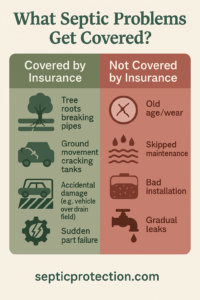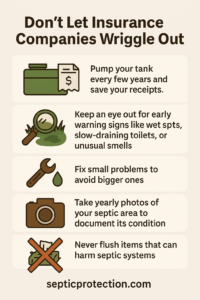Septic Tank Insurance: What You Need to Know
Got a septic tank? You might worry about what happens if it breaks. Fixing septic tanks costs a lot. Good news — your home insurance might already cover it under Septic Tank Insurance. Understanding what’s included can save you thousands in unexpected repairs.
Does My House Insurance Cover My Septic Tank?
Many folks don’t know their regular house insurance might already protect their septic tank. Look at your policy for words like “underground services” or “external pipes and tanks.” That’s often where septic coverage hides.
Most basic home policies will pay if something sudden or unexpected damages your tank. Say a tree root cracks it, or the ground shifts and breaks a pipe. Your insurance might step in to help with those costs.
 What Septic Problems Get Covered?
What Septic Problems Get Covered?
Insurance usually pays for sudden damage, not slow problems. Here’s what’s often covered:
- Tree roots that break through tank walls or pipes – they love the moisture around septic systems.
- Ground movement that cracks or shifts your tank (possibly after heavy rain or during dry spells when soil shrinks).
- Accidental damage – such as someone driving over your drain field or tank.
- Sudden failure of parts inside the tank (for example, walls between chambers or inlet pipes).
What Septic Issues Won’t Get Covered?
Don’t expect insurance to pay for everything. They won’t cover:
- Old age – septic tanks wear out over time, and insurance doesn’t pay just because your system got old.
- Skipping pumping or cleaning – if you didn’t maintain your tank and that caused the problem, you’ll pay the bill yourself.
- Bad installation – if your system was set up incorrectly years ago and is now failing, that’s usually not covered.
- Gradual leaks or seepage – slow problems that developed over time generally get denied.
How to Check Your Coverage
Find your policy papers and look for sections about “external structures” or “underground services.” Sometimes septic tanks are listed under plumbing. If you’re unclear, call your insurance company directly and ask, “Is my septic tank covered, and for what types of damage?” If possible, get their answer in writing.
Some companies specialize in helping with septic claims – experts who speak insurance jargon and spot policy details you might miss. It’s worth talking to one if your claim gets messy.
Don’t Let Insurance Companies Wriggle Out
Insurance companies hate paying claims – that’s just how they work. So protect yourself:
- Pump your tank every few years and save your receipts.
- Keep an eye out for early warning signs – wet spots, slow-draining toilets, or unusual smells.
- Fix small problems before they turn into disasters; slow leaks can become big failures that look like neglect.
- Take yearly photos of your septic area to document its condition.
- Never flush items that can harm septic systems – wipes, grease, and harsh chemicals give insurance companies excuses to deny claims.
Making a Septic Tank Claim
If disaster strikes your septic system:
- Take photos of everything before repairs begin (once you start digging, evidence may be destroyed).
- Call your insurance company right away – don’t delay until after repairs.
- Get multiple repair quotes to show that you’re not overpaying.
- Explain that the damage happened suddenly (if that’s true), since sudden damage is generally covered while gradual problems are not.
Real World Septic Claims
Many homeowners have successfully claimed for septic damage. For example, one family had a tree root break through their tank wall after a storm – insurance covered an $8,000 repair. Another homeowner experienced sewage backing up into their shower when their drain field collapsed due to soil shifting; their policy paid for a $12,000 fix because the damage happened suddenly.
However, not all claims succeed. One family skipped pumping their tank for ten years, and when it failed, the insurer declared it neglect and refused to pay.
Bottom Line on Septic Insurance
Most home insurance policies already cover sudden septic damage – you might not need extra coverage. However, it’s crucial to maintain your system, keep detailed records, and act fast when issues arise.
Read your policy or call your agent to confirm your coverage. It’s better to know now than discover your yard has turned into a sewage pond later. Septic repairs cost thousands, and good insurance coverage gives you peace of mind that you won’t have to face that bill alone if disaster strikes your underground waste system.
#Note: Policies may vary; check them carefully.
- Septic Tank Additive
- How to Budget for Your Septic System the Smart Way
- Septic Tank Replacement Cost
- Septic System Inspection Checklist
- How Often to Pump Septic Tank
- Buying a Home with a Septic Tank
- Pros and Cons of Septic Systems
- Septic Tank Install Is It Right for Your Rural Property?
- Off Grid Septic System 7 Reasons Why It Makes Sense
- Septic vs Sewer
- Septic vs Public Sewer
- How a Septic System Works
- Professional Septic Tank Cleaning
- Septic Tank Installation
- Septic Tank Maintenance Products
- DIY Septic System
- Best Toilet Paper for Septic Tanks
- How Do Septic Tanks Work
